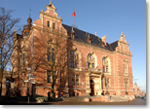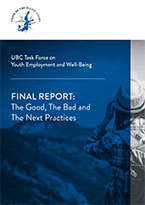Secretariat
Wały Jagiellońskie 1
80-853 Gdańsk Poland
tel. +48 58 301 09 17
tel. +48 58 301 91 23
fax +48 58 301 76 37
 Contact us
Contact us


V General Conference,
Stockholm, 24-25 September 1999
- Conference Report
- Program (12.79 KB)
- Speeches
- Reports from the conference workshops (69.67 KB)
- Commission Reports and Action Plans (276 KB)
- Report on UBC Activities 1997-1999
- Resolution
- UBC Strategy 1999 (59 KB)
- UBC LA 21 Action Program (117.59 KB)
- UBC Environmental Award (22.2 KB)
- Photos
Conference Report
The V General Conference of the Union of the Baltic Cities was held on 24-25 September 1999 in Stockholm, Sweden, at the invitation of the Mayor of Stockholm. The principle theme of the Conference was "EU enlargement in the Baltic Sea region - the role of cities, regions and states".
The Conference was attended by ca. 200 participants, including representatives of 67 Member Cities, as well as invited guests from governments and international organisations.
The first day of the Conference was devoted to the EU enlargement process in the Baltic Sea region. The second day was devoted to internal UBC matters such as reports, elections etc.
FRIDAY, 24 SEPTEMBER 1999
WELCOME AND OPENING ADDRESSES
Mr Carl Cederschiöld, Mayor of the City of Stockholm, warmly welcomed all participants to Stockholm for the V UBC General Conference.
The V UBC General Conference was opened by Mr Anders Engström, President of the Union of the Baltic Cities.
KEYNOTE SPEECHES
The following keynote speakers submitted presentations related to the Conference principle theme:
Mr Sven-Erik Soder, State Secretary, Ministry of Foreign Affairs of Sweden
Mr Ulf Dienkelspiel, President of the Swedish Trade Council
Mr Jarle Skjorestad, State Secretary, Ministry of Foreign Affairs of Norway
Mr Pierre Schori, Member of the European Parliament, Sweden
CONFERENCE WORKSHOPS
The following workshops were held concurrently during the first day of the conference:
I. Impacts on cities of EU membership
II. New geopolitical situation in the Baltic Sea region
COMMISSION MEETINGS
All UBC Commissions held working meetings to discuss reports from the last period and action plans for the next two-year period.
SATURDAY, 25 SEPTEMBER 1999
REPORT ON UBC ACTIVITIES
Mr Anders Engström, the President of the Union, submitted the report on UBC activities during the period September'97 - September'99. The Conference adopted the Report.
REPORTS OF THE COMMISSIONS
The following Commission chairpersons submitted reports and action plans to the assembly:
Mr Maciej Brzeski, Gdynia, Commission on Business Cooperation
Mr Lars Malmborg, Kalmar, Commission on Communication
Mr Sławomir Szafrański, Szczecin, Commission on Culture
Mr Ivo Eesmaa, Kärdla, Commission on Education
Mr Mikko Jokinen, Turku, Commission on Environment
Ms Karin Wohlgemuth, Rostock, Commission on Health & Social Affairs
Mr Władysław Kozakiewicz, Gdynia, Commission on Sport
Mr Kyrre Dahl, Kalmar, Commission on Tourism
Mr Maciej Krzyżanowski, Gdańsk, Commission on Transportation
Mr Jussi Kautto, Helsinki, Commission on Urban Planning
Ms Hjördis Höglund, Sundsvall, Women's Network
Additionally Mrs Christine Jakobsson, Baltic 21 Secretary General, made a presentation on the background and goals of Baltic 21.
The Conference took note of the reports.
PROCEDURAL MATTERS
1 AMENDMENTS IN UBC STATUTE
Mr Anders Engström presented the proposed amendments to the UBC Statute as submitted by the Executive Board. The Conference decided to accept the proposed amendments to the Statute.
2 ADOPTION OF THE UBC STRATEGY
Mr Bartłomiej Sochański, UBC Vice-President, responsible for the development of the new UBC Strategy, recalled that the Strategy development process started at the end of 1997. The outline of the document was developed by the Strategy working group in 1998. Subsequently the Executive Board discussed the Strategy at several meetings. Mr Sochański expressed his thanks to all persons who contributed to the creation of the Strategy.
The General Conference adopted the new UBC Strategy.
3 ADOPTION OF UBC LA21 ACTION PROGRAM
President Anders Engström informed the Conference that the UBC Local Agenda 21 Action Program was developed by the UBC LA 21 Working Group initiated by the Commission on Environment. Mr Engström stressed that sustainable development and Local Agenda 21 work must be considered as a basis for all UBC activity.
The General Conference decided to adopt the UBC Local Agenda 21 Action Program.
4 AUDITOR'S REPORT FOR 1997-1998
Mr Paweł Żaboklicki, the Secretary General of the Union, presented the auditor's report on UBC accounts for 1997-1998, which was prepared by the licensed auditing office 'BILANS' from Gdańsk, stating that the Union financial transactions and records within the mentioned period have been handled properly. The Conference took note of the report.
5 BUDGET AND MEMBERSHIP FEES 2000-2001
President Anders Engström presented the Executive Board's proposal for the UBC budget and membership fees for the financial period 2000-2001.
The Conference approved the budget and membership fees for the financial period 2000-2001.
6 ELECTION OF THE EXECUTIVE BOARD
The following cities were elected as members of UBC Executive Board for the next two-year period: Aalborg (Denmark), Bergen(Norway), Gdańsk (Poland), Liepāja (Latvia), Pori (Finland),Rostock (Germany), Šiauliai (Lithuania), St.Petersburg (Russia),Stockholm (Sweden), Tartu (Estonia).
7 ELECTION OF PRESIDENT AND TWO VICE-PRESIDENTS
The General Conference elected for a two-year period:
Mr Anders Engström, Kalmar, as President of the Union
Mr Eugenijus Gentvilas, Klaipėda, as Vice-President of the Union
Mr Armas Lahoniitty, Turku, as Vice-President of the Union
Mr Anders Engström expressed his thanks to outgoing UBC Vice-Presidents Mr Michael Bouteiller and Mr Bartłomiej Sochański for their outstanding contribution to the work of the Union.
8 ELECTION OF THE BOARD OF AUDIT
President Anders Engström presented the candidates for the Board of Audit proposed by the Executive Board:
Ms Silvia Löbner, Head of Auditing Department, Wismar
Mr Kim Roessell, Head of International Affairs Department, Copenhagen
Mr Bartłomiej Sochański, City Councillor, Szczecin
The General Conference elected the persons listed above to the UBC Board of Audit for a two-year period.
9 APPROVAL OF UBC AUDITOR FOR 1999-2000
President Anders Engström informed the Conference that the Executive Board decided to propose the Bilans Auditing Office from Gdańsk as UBC auditor for 1999-2000. The General Conference approved the Bilans Auditing Office from Gdańsk as UBC auditor for 1999-2000.
10 DECISIONS REGARDING THE COMMISSIONS
President Engström reminded the Conference that the Executive Board decided to create two new UBC Commissions in 1998, ie. the Commission on Education and the Commission on Urban Planning.
The General Conference approved the creation of the Commission on Education and the Commission on Urban Planning.
Moreover the President informed the Conference that the Commission on Communication applied to the Executive Board to terminate the Commission. The main reason to establish the Commission on Communication was to improve the communication facilities between the member cities. The Commission concluded that the improvement of telecommunication systems and creation of the Internet solved the problem. Having this in mind, the Executive Board decided to terminate the Commission on Communication.
The General Conference approved the Executive Board decision to terminate the Commission on Communication.
President Anders Engström stressed that the work on internal and external communication of the Union must be carried out by other UBC structures.
11 BEST ENVIRONMENTAL PRACTISE IN BALTIC CITIES AWARD
The idea of Best Environmental Practise in Baltic Cities Award came from the Commission on Environment. The intention of the award is to encourage member cities to develop their administration and services in innovative ways for the good of the whole municipality and its citizens. The first award was granted during the V General Conference to the City of Tartu for the project "Tartu Agenda 21".
12 TIME AND VENUE OF THE NEXT CONFERENCE
Following the proposal of the Mayor of Rostock, Mr Arno Pöker, the General Conference decided to hold its 6th Meeting in the City of Rostock in the year 2001.
13 ADOPTION OF THE CONFERENCE RESOLUTION
President Anders Engström presented the Conference Resolution on European Union Enlargement in the Baltic Sea Region. The Conference adopted the Resolution.
CLOSING OF THE CONFERENCE
Mr Anders Engström, the President of the Union, expressed his warm thanks to the City of Stockholm, delegates from member cities, speakers, guests and the UBC Secretariat for their outstanding contribution to the success of the V UBC General Conference.
200 delegates, representing 67 member cities of the Union of the Baltic Cities (UBC) met in Stockholm at the 5th UBC General Conference on 24-25 September 1999. The theme of the General Conference was: "EU-Enlargement in the Baltic Sea Region - the role of cities, regions and states".
The participants of the Conference:
Welcome
- The enlargement of the European Union in the Baltic Sea Region and the emergence of the Baltic Sea as an Inland Sea of the European Union.
- The Baltic Sea Region to be a European Region of significant political and economic importance characterised by peace, stable economic growth, social and environmental development and ever-growing co-operation at all levels.
Note
- The outcome of the 8th ministerial session of the CBSS in Palanga in June 1999, specially the support of decentralised co-operation.
- The treaty of Amsterdam, signed by member states of the European Union in June 1997 and entered into force in May 1999
- The conclusions of the European Council in Vienna in December 1998, approving amongst others the European Commission's report "Northern Dimension" and the conclusions of the European Council in Berlin in March 1999
Recognise
- The importance of cities and other sub-national governmental levels in the process of building a stable Baltic Sea Region
- The need for all sub-national governmental levels, including cities and local authorities, to actively engage in the European Union enlargement process in the Baltic Sea Region in order to secure a successful enlargement process in the region.
- The need for support from the European Union to cope with the very great changes of city activities and strategies that follows EU membership.
Call on the EU Commission and Governments of the Baltic Sea Region Countries, as appropriate
- To actively engage the sub-national governmental levels in the accession countries during the accession process and to pay great attention to the needs, views and standpoints of the local and regional level in order to secure success for the enlargement process.
- To support the organisations representing the sub-national level both on national level and on Baltic Sea Regional level by actively involving them in the enlargement process as well as make use of them for giving information, acquiring information and carrying out training programs for local politicians and staff of the sub-national governments in order to secure success for the enlarged European Union.
- To open new or improved European Union funding facilities, supporting sub-national level co-operation. The funding should primarily aim at facilitating the enlargement process in a broad sense. Baltic Sea regional as well as national associations of sub-national governments should be involved in the management of the funding. Representatives of sub-national governments or their associations in the Baltic Sea Region should take decisions on projects to be financed.
- To facilitate and support sub-national cross-border co-operation with Western Russia and the Kaliningrad district during and after the accession process.




